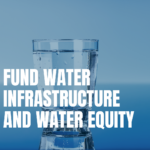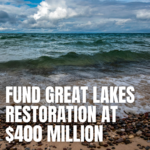Progress has been made, but more needs to be done to protect the lakes and the people who rely on them.
Last January, we set an ambitious agenda for the incoming Biden administration and new Congress. And by the end of the year, we saw exciting progress for the Great Lakes. Historic bipartisan infrastructure legislation included funding to speed up efforts to remove dangerous lead drinking water pipes, stop invasive carp, implement on-the-ground Great Lakes restoration projects, and more. And through a mix of legislation and executive orders, the administration and Congress have begun the important work of addressing long-standing environmental injustices and slowing climate change.
Yet the list of needs to protect the Great Lakes and the people who depend on them is long. Our policy team has identified our top three federal Great Lakes priorities for the coming year. In 2022, the Alliance urges the Biden administration and Congress to:
- Increase water infrastructure funding and prioritize fixing environmental injustices
- Fund Great Lakes restoration at $400 million
- Fully fund invasive carp protections
Last year our top federal policy priority urged the Biden administration and Congress to prioritize environmental justice. While they have taken initial steps, federal water programs must continue to shift to prioritize low-income communities and communities of color, where the burden of pollution often hits hardest. Repairing the long-term harm from environmental injustice issues can’t be a one-time step. Instead, it must be incorporated into every federal program and measured publicly to show progress. And protecting our communities from the impacts of a changing climate means building resilience into federal Great Lakes programs as well. Environmental justice and climate change are embedded in each of our 2022 policy priorities.
Read on for more details of our federal policy agenda.
Increase water infrastructure funding and prioritize fixing environmental injustices

Last year Congress passed historic bipartisan legislation – the Infrastructure Investment and Jobs Act of 2021 – to address the nation’s backlog of infrastructure projects. The bill included about $50 billion over the next five years to fix failing and outdated drinking and wastewater infrastructure nationally. It was a critical down payment to help communities remove lead drinking water pipes, stop sewer overflows into rivers and lakes, and prevent community flooding.
But it’s not enough. Great Lakes states alone need an estimated $188 billion over the next 20 years for their water infrastructure needs.
We call on Congress and the administration to build on the bipartisan infrastructure bill and:
- Increase funding to $8.3 billion for the Clean Water and Drinking Water State Revolving Funds, the main pathway to distribute water infrastructure funding to states
- Ensure that infrastructure dollars prioritize disadvantaged communities for funding as grants
- Support nature-based infrastructure solutions like rain gardens and permeable pavement
- Enact a ban on residential water shutoffs due to nonpayment and require reconnection of water service
- Establish a permanent low-income water assistance program
For full details of our water infrastructure policy asks, download our fact sheet.
Fund Great Lakes restoration at $400 million

The Great Lakes Restoration Initiative (GLRI), established over 15 years ago, is one of the most important tools in the region’s toolbox to protect and restore the lakes. The program provides funding for on-the-ground restoration projects, from wetland restoration to cleaning up toxic hotspots. In addition to environmental benefits, GLRI funding garners a 3-to-1 return in additional economic benefits across the region.
While we need continued investment in the program, the strategy guiding the GLRI needs an update to ensure that funds are reaching communities most in need and to address climate change.
We call on Congress and the administration to:
- Allocate at least $400 million for the Great Lakes Restoration Initiative this year
- Increase funding for cleaning up toxic hotspots around the lakes using additional GLRI funds included in the bipartisan infrastructure bill
- Update the strategy guiding the GLRI with a focus on combating environmental injustices and climate change
For full details of our Great Lakes restoration policy asks, download our fact sheet.
Fully fund invasive carp protections

Invasive carp pose a clear threat to the Great Lakes. Established populations of these harmful fish are only 50 miles from Chicago and Lake Michigan. But it’s not too late to prevent them from reaching the lakes. The U.S. Army Corps of Engineers has proposed the construction of additional carp prevention measures at the Brandon Road Lock and Dam, located near Joliet, Illinois. The facility is a critical choke point in the waterways leading to Lake Michigan.
Earlier this year, the U.S. Army Corps of Engineers dedicated funding received in the bipartisan infrastructure bill to wrap up project design and get started on construction. But more needs to be done.
We call on Congress and the Biden administration to:
- Adjust the cost-share for the Brandon Road project to 100 percent federal funding in the Water Resources Development Act of 2022 due to the project’s national scope
- Ensure ongoing updates and regular input from the public on the Brandon Road project
For full details of our invasive carp policy asks, download our fact sheet.
